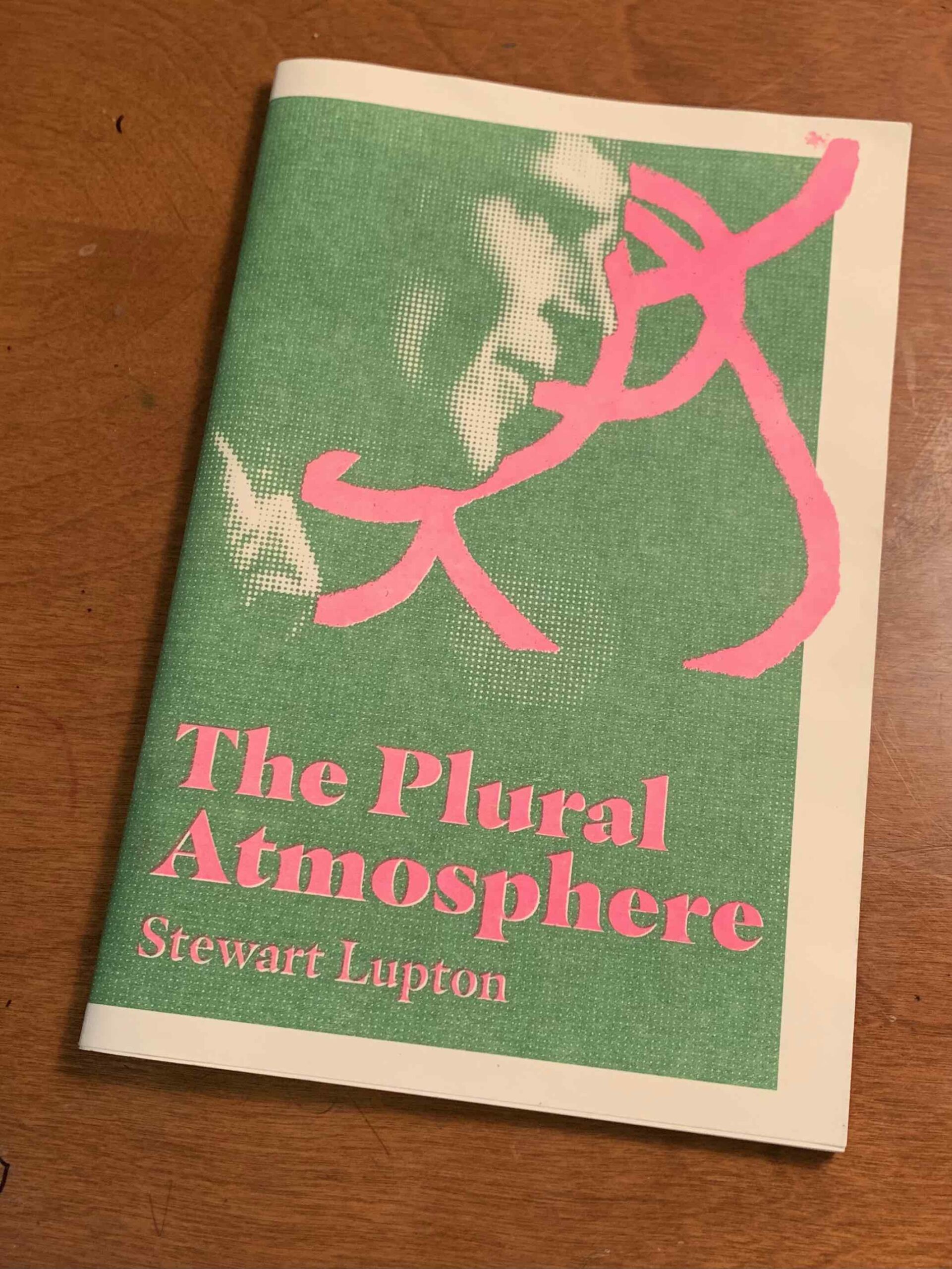Stewart’s Plural Atmosphere

During his lifetime, Stewart Lupton published little to almost none of his poetry. So it is a great boon to have this little chapbook in my library to remember him by. Stewart will most often be remembered for his musical accomplishments, perhaps most notably as the frontman for a band called Jonathan Fire*Eater, which rose to a kind of fame before splitting apart. Later, in Washington, D.C., where I knew Stewart in the mid-aughts, he played in a trio he called Childballads. Or was it Child Ballads? or perhaps The Child Ballads? At any rate the band’s name, referring to the work of the anthologist Francis James Child, was in line with Stewart’s abiding interest in the history of literature. His chronic unsettledness had a way of manifesting in the titles he gave to things. When I knew him, I happily knew little of his past in New York City with Jonathan Fire*Eater or the recordings that are part of his legacy. He was a friend of mine.
The chapbook, The Plural Atmosphere, now out of print but available from the publisher in PDF, has been elegantly and tastefully printed, evidently with a Risograph printer, with Stu’s face on the cover. Walter Martin and Alison Mosshart, friends of the author, offer brief introductions, and Dame Darcy’s illustrations are featured. Unsurprisingly, like most small press publications, it received very little critical notice at the time. Without eulogizing Stewart, I would like to briefly describe it. Not because it is a major achievement, but because it is Stu’s final work, because his work touched many lives, and because we will not have another.
There are twenty-three poems in all, along with some realia in reproduction: a creased typescript facsimile, the reproduction of a flyer entitled ATTITUDE LESSONS, which Stewart must have posted on street corners around his Washington, D.C. neighborhood. Two poems I remember reading in 2006, when Stu gave me printed copies of them, but the others are all new to my eyes. Several were composed in the period 2015-2018, while he was living in a psychiatric care facility in California.
The poems are a record of Stewart’s personal mythology, with certain images and themes recurring—teeth, shoes, alleyways, gradations of light and shade, childhood, daydreams, mittens, nostalgia, out-of-place objects and musty interiors, disrupted by Poseidon or John Clare. Objects are lost, pawned, abandoned (shoe, mitt, shopping cart). There is the smell of old things which predominates here. And there is the uneasy fact of Stew’s suicide, and his first unsuccessful attempt, that malinger here as well. Poignant lines evocative of the body’s ruin, as in the poem “I Come from the Land of Bruises and Meander.” “I am wrist-shackled to meat,” he says; “This is all I know how to cup, all I know how to give. / This is my portion of the human tragedy.” / “You, come over here, this is going to hurt.” There is the sense of an outsider trawling the urban environment and marking the irreconcilable divide of safe, cozy domestic interiors from the world of junk-sick petty criminals. As in “The Red Alleyway”:
Snug from cars that crush the bones of kittens
thugs that mug you for your mittens
There is good poetry here. But my favorite poem here is the reflective and retrospective atmosphere of “John Clare Classroom,” the final poem in the collection.
I am intimate with it, be it Seneca or John Clare or heroin, Chaplin…. I have lived them all and their dominoes fall through my blood and push it to my heart so I can stand up from my desk, be excused, the scar in my eyes a hall pass, my dancing shoes just outside the door.
The lyrics to Stew’s songs are not reproduced here, though they are certainly among his best poetic works (e.g., “The Search for Cherry Red” and “The Onion Domes of Tallahassee” (a.k.a. “Cheekbone Hollows”)). As in the poems in this collection, those songs are a testament to Stewart’s power to conjure mythologies in just one or two hundred words, a rare power.
There is a line from “Cheekbone Hollows” that has always stayed with me. I tried hard to make the world an exotic place. Indeed, he did. Before me, a volume of John Clare lies, unread. Rest in peace, old friend.